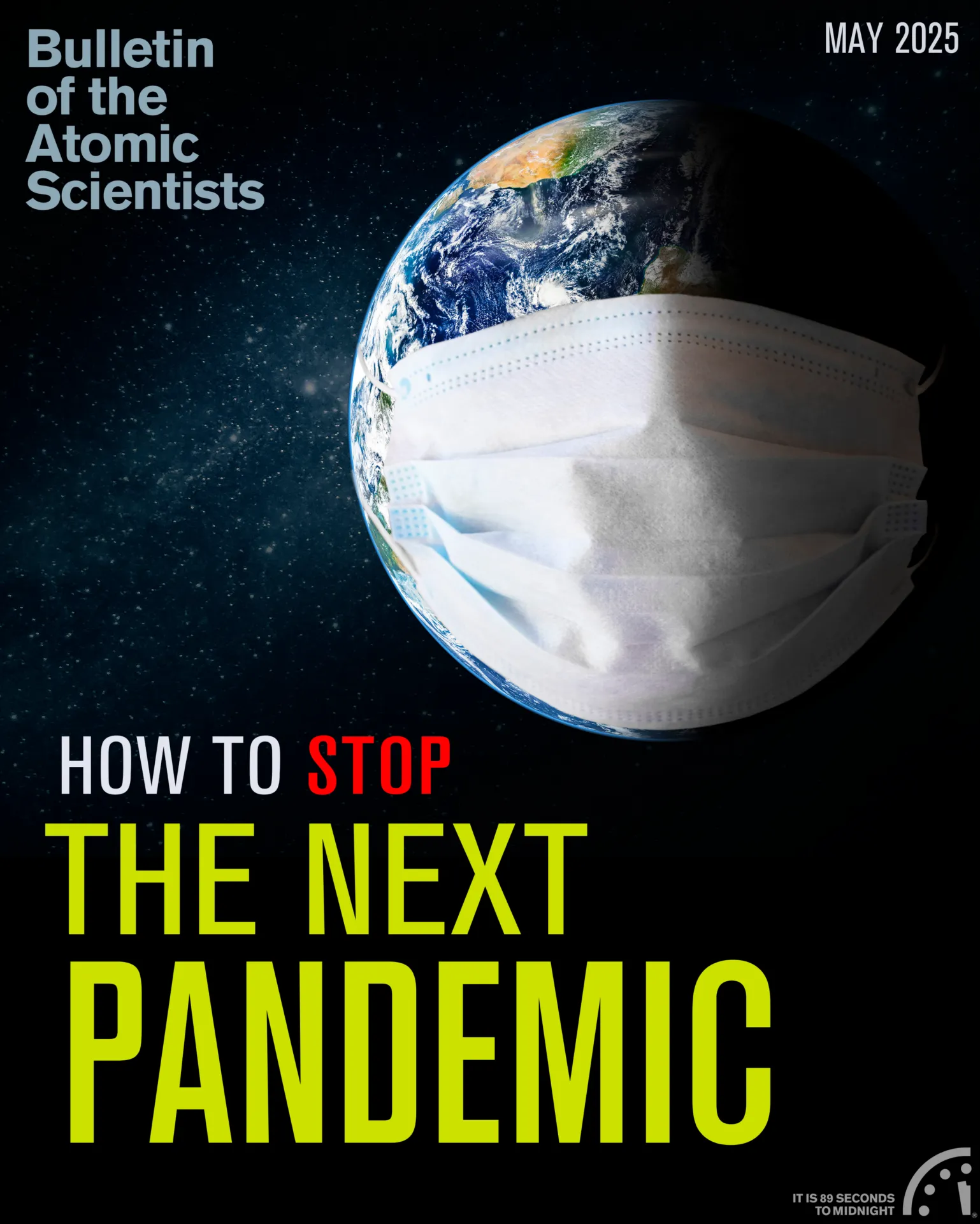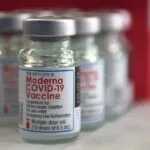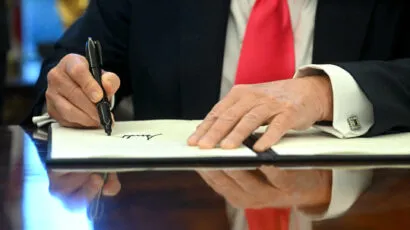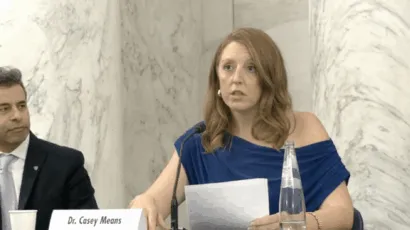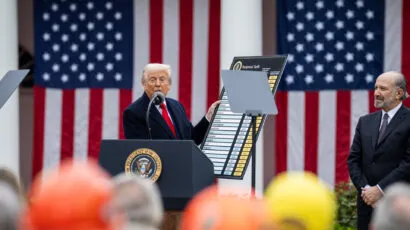Introduction: How to stop the next pandemic
By Dan Drollette Jr | May 13, 2025
Introduction: How to stop the next pandemic
By Dan Drollette Jr | May 13, 2025
Closing businesses and schools. Isolating and quarantining individuals. Banning public gatherings. Requiring masks.
These were all highly effective public health measures enacted in a time of a global pandemic, aimed at suppressing the spread of the disease.
But the measures were also highly disruptive; some places of business didn’t survive, while others only limped along. Incomes suffered, with the poorest hit hardest. This led to a major push-back from the public and some political figures, causing mistrust in public health agencies and science itself. Under this pressure, some officials caved in and re-opened businesses prematurely—resulting in more deaths.
The image painted above sounds familiar.
But it is not about COVID.
Instead, it’s a capsule history of the influenza epidemic of 1918, as described in “Pandemics, public health, and popular support: What history can tell us” by University of Michigan historian J. Alex Navarro. He argues that what America experienced during the COVID-19 pandemic was anything but unique, and that there are lessons to be learned from past pandemic containment efforts.
This issue of the Bulletin of the Atomic Scientists is devoted to lessons learned from the recent COVID pandemic—and how to stop or constrain the next pandemic, by buttressing public support for public health efforts. To be effective in containing a pandemic, rates of compliance with quarantine rules and masking must be high, which means that there must be accurate and consistent public health messaging, equitable implementation of health orders and recommendations, and an understanding of the burdens these measures can cause.
But balancing these countermeasures and the public responses to them during a raging pandemic is easier said than done.
Because while the United States has made huge investments in scientific research and technology—an effort that former National Institutes of Health director Monica Bertagnolli describes in an interview as “basic science on steroids”—this country has not put enough money and effort into the less glamorous, everyday work of public health. Somewhat surprisingly for someone who once headed a $47 billion agency devoted to big science, Bertagnolli feels that to capitalize on the cutting-edge technology that the United States has developed, it must invest more in basic public health outreach, monitoring, and working with and trying to win over those in society who are most at risk—and who also have the least trust in the country’s medical system.
Unfortunately, since the start of the COVID-19 pandemic, foreign, state-sponsored disinformation operations have tried to make a bad public health situation worse. As University of Manchester researcher Maksim Markelov notes in his article, “Amplifying doubt: How Russian trolls leveraged pandemic uncertainty for strategic gain,” Russia-sponsored influencers tried to throw sand in the gears of any public health response by Western democracies “with a strategy aimed at sowing confusion, amplifying deep-seated anxieties and contradictions, fostering ideological polarization, and transforming pandemic discourse into yet another site of contestation. By strategically amplifying both vaccine skepticism and criticism of government failure and overreach, this operation did not merely seek to instill doubt in a particular version of reality. Rather, it aimed to erode faith in the very possibility of a shared reality altogether.”
The predictable result has been a steady decline of trust in medicine, science, government, society—and even the fundamental ability of human beings to work together and get things done.
“If you look at our current political situation, it’s clear that we’ve learned nothing,” says Sonia Shah notes in her Bulletin interview, “Pandemics and pushback.” Shah, author of popular nonfiction books on cholera, Ebola, and malaria—books which came out years before COVID hit in 2019—argues that recent events show that “we’ve gone absolutely backwards, we’re headed in the wrong direction. So maybe what we’ve learned actually is that if you take strong public health measures, there will be such a strong backlash that you will unravel 100 years of progress in public health. So maybe that’s the lesson.”
It can feel like it is hard to disagree, after the Trump administration has tried to cut funding to the National Institutes of Health by 35 percent, effectively killed the US Agency for International Development, and withdrawn the United States from the World Health Organization. As Scott Greer and Rachel Kulikoff note in “The future of global health, without the United States,” the changes wrought by the second Trump administration have already been momentous—and the administration is only a little over two months old as of the time of this writing.
But there are rays of hope in the field of pandemic prevention and preparation. Artificial intelligence, machine learning, and related technologies have the potential to accelerate antimicrobial drug discovery and development, as outlined in “How AI can slow the rise of antibiotic-resistant ‘superbugs.’ ” To contain the rise of antibiotic-resistant bacteria, scientists need to create new drugs in the laboratory, and clinicians need to get the right drug to the right patient. AI may be the tool humanity needs to turn the tables on superbugs, providing an elegant set of solutions that can supercharge drug discovery, predict emerging threats, and improve clinical care.
At the same time, scientists have also been pursuing what is known as a “universal vaccine” against influenza, both to protect against seasonal influenza and against potential flu pandemics. As detailed in “The ‘holy grail’ of pandemic preparedness,” the idea is that while seasonal flu vaccines target a constantly shape-shifting protein on influenza viruses and therefore must be updated each year to match the latest strain of the flu, a universal vaccine would target an unchanging part of the virus.
If efforts like these can succeed, then the next time around, it may indeed be possible to stop the next pandemic dead in its tracks, without the quarantines, school and business closures, and masks that have alienated the public previously.
Together, we make the world safer.
The Bulletin elevates expert voices above the noise. But as an independent nonprofit organization, our operations depend on the support of readers like you. Help us continue to deliver quality journalism that holds leaders accountable. Your support of our work at any level is important. In return, we promise our coverage will be understandable, influential, vigilant, solution-oriented, and fair-minded. Together we can make a difference.
Keywords: National Institutes of Health, biomedical research, covid, epidemic, pandemic, public health, vaccine skepticism
Topics: Special Topics

